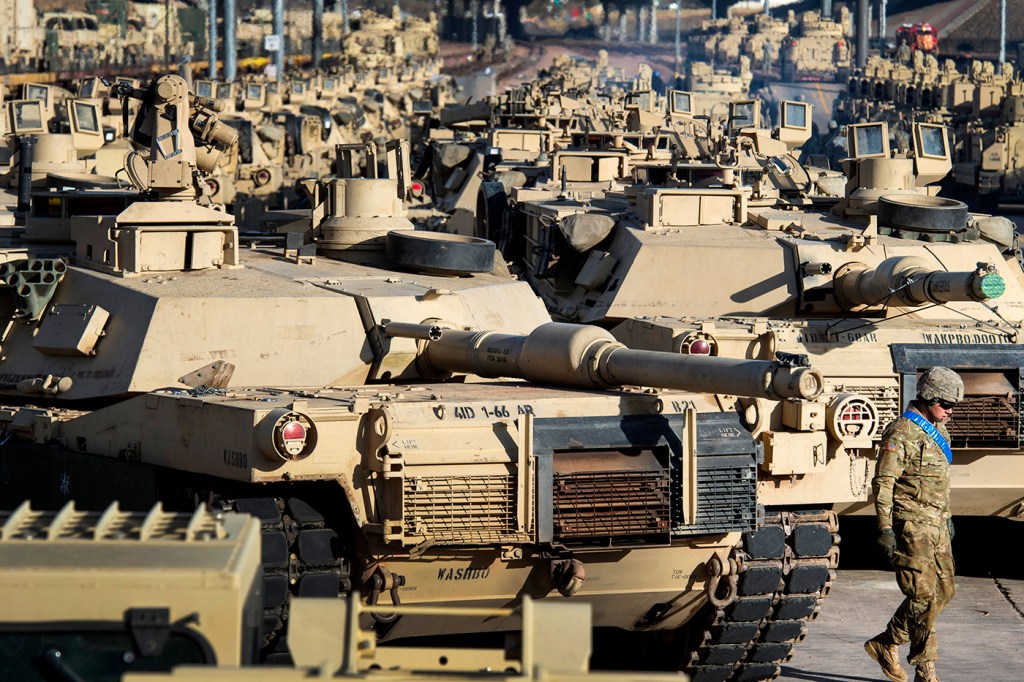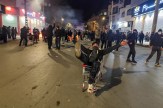Western allies ‘ramping up’ in Ukraine despite corruption scandal

Germany, the United States and other allies announced that they will supply Ukraine with some of the world’s best tanks, despite a corruption scandal in Ukraine’s Ministry of Defense.
German Chancellor Olaf Scholtz announced Wednesday that Germany will send Ukraine 14 of its Leopard 2 tanks and won’t prevent other countries from re-exporting their Leopards. Hours later, President Joe Biden said the U.S. will supply 31 M1 Abrams tanks to Ukraine.
“It is another stage of ramping up the Western allies’ willingness to provide [Ukraine with] heavy weaponry. And it’s a significant step,” says Mai’a Cross, dean’s professor of political science, international affairs and diplomacy, and director of Northeastern’s Center for International and World Cultures.
Cross says it was a hard thing to agree to, especially for Germany, because the concern of the allies from the beginning of the war was that Russia could use equipment provisions as a reason to expand the war.

The latest Germany-U.S. breakthrough is an example of a diplomatic maneuver, Cross says. Germany has shied away from being at the forefront of military action, given its role in World War II.
“It must always feel that it is moving in lockstep with its allies. And that’s why we see an announcement of Germany plus multiple other European countries agreeing to provide tanks,” Cross says.
The U.S. strategy to announce just hours after Germany, she says, shows an effort to allow its allies to take steps first.
Several European allies and the U.S. have already pledged about 100 tanks, while Ukraine says it needs 300 in order to push back against Russia. Still, the collective action of the allies demonstrates an importance for Ukraine to maintain its territorial integrity and for the war to end, Cross says.
Although it will take months for Ukraine to receive the tanks, Cross thinks that some will arrive in time for spring and help regain territory that Russia is holding.
While Ukraine and the world was waiting for Germany’s decision about the Leopards, the Ukrainian press published documents suggesting that Ukraine’s Ministry of Defense has been paying two to three times more for army food supplies than the same items cost in local food stores.
President Volodymyr Zelenskyy reacted to the scandal by firing personnel across the government. Reacting to the corruption, officials in several countries demanded more accountability for aid. U.S. State Department spokesperson Ned Price said the U.S. was working with Ukraine to ensure accountability.
“Of course, you don’t want to see the misuse of international funds that have been donated for the war effort,” Cross says.
Cross says Zelenskyy’s reaction to the corruption was incredibly important. It demonstrates that he and the Ukrainian government are committed to using the donated money for the war effort.
“That should placate people’s concerns,” she says. “I don’t think ultimately this will have any effect on the willingness of countries to continue to support Ukraine.”
At the same time, Cross says, it wasn’t surprising that corruption is going on in Ukraine. After all, she says, rooting out corruption has been one of the top requirements of any Central or Eastern European country wanting to join the EU, including Ukraine.
In 2021, Ukraine ranked as the second-most corrupt country in Europe after Russia, according to Transparency International’s Corruption Perceptions Index.
“It’s a legacy of the authoritarian past under the Soviet Union that we’re seeing and the efforts to launch a capitalist economy very, very quickly,” Cross says.
Ukraine has been battling corruption for over 30 years, says Ekaterina Botchkovar, undergraduate program director and associate professor at the School of Criminology and Criminal Justice at Northeastern. The Soviet Union was fraught with corruption and organized crime in its last years of existence, she says.
“Corruption is incredibly difficult to stamp out because it is highly profitable, pervades all societal structures, and easily integrates itself into the cultural fabric of a society,” she says.
In the 1990s, most post-Soviet countries experienced economic and political turbulence, which allowed the select few to take control over the resources leftover from the USSR and exploit them freely. Modern Ukraine has created multiple institutions to combat the issue, Botchkovar says, with state and civil organizations making it a priority to address the problem.
But the progress has been uneven, she says, given the economic and political challenges Ukraine has been also going through. Zelenskyy made it his presidential campaign goal in 2019 to fight corruption and curtail political and economic influence oligarchs have in the country.
“Warfare absolutely does increase the likelihood of corruption,” Botchkovar says. “It [war] undermines and sometimes fully destroys social institutions that support conventional networks, activities and the rule of law. It also undermines the economy of the affected country, and it creates a variety of opportunities to engage in illicit activities.”
Wars, like any dramatic societal event, create a sense of normlessness, she says, which can be described as a loss of moral compass that helps people tell right from wrong.
“Without it, people feel free to simply pursue their goals, no matter the cost,” she says. “Wars are thus inherently criminogenic.”
Many criminologists see people’s behavior as a product of personal beliefs that work in conjunction with weighing the rewards and costs of committing a crime. Some people will feel that engaging in illicit activities in times of war is not allowed, Botchkovar says. Others may be more affected by the context of normlessness.
“They will disregard the national emergency and pursue maximum profit. After all, white-collar crime is profitable,” she says. “What also helps in the times of war is the perceived, or real, lack of accountability, which gives many people an additional push to proceed.”
Alena Kuzub is a Northeastern Global News reporter. Email her at a.kuzub@northeastern.edu. Follow her on Twitter @AlenaKuzub.






